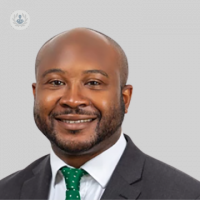Urinary tract infections: Understanding the most common causes
Written in association with:The symptoms of urinary tract infections (UTIs) can range from mild discomfort to severe pain and serious complications. To learn more about the causes of UTIs and how to prevent them, we invited Mr Nkwam Michael Nkwam, a distinguished consultant urological surgeon, to share his expert insight.

What are the most common causes of urinary tract infections?
Urinary tract infections (UTIs) can occur due to various factors. Some common reasons why some people may be more prone to UTIs include:
Anatomy
Differences in urinary tract anatomy can affect the flow of urine and make it easier for bacteria to enter and cause infections.
Sexual activity
Women are more susceptible to UTIs due to their shorter urethra, which allows bacteria to reach the bladder more easily. Sexual activity can also contribute to UTIs.
Age
Elderly individuals may be at higher risk due to weakened immune systems or age-related changes in the urinary tract.
Pregnancy
Hormonal changes during pregnancy can make UTIs more common.
Urinary catheters
People with urinary catheters have an increased risk of developing UTIs because bacteria can enter the urinary tract through the catheter.
Immune system
A weakened immune system can reduce the body's ability to fight off bacterial infections, including UTIs.
Personal hygiene
Poor bathroom hygiene can increase the likelihood of bacteria entering the urinary tract.
Underlying health conditions
Conditions like diabetes or kidney stones can make UTIs more likely.
Voiding habits
Holding urine for extended periods or not fully emptying the bladder can contribute to UTIs.
Is it possible to prevent UTIs?
It's important to note that each person's susceptibility to UTIs can be influenced by a combination of these factors, and some people may have a higher overall risk compared to others. Maintaining good hygiene, staying hydrated, and seeking prompt medical attention for UTIs are essential preventive measures.
To schedule a consultation with Mr Nkwam, visit his Top Doctors profile today.


